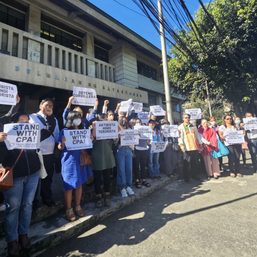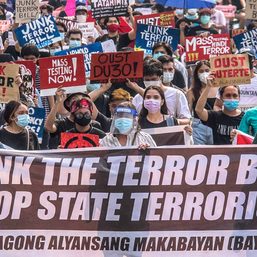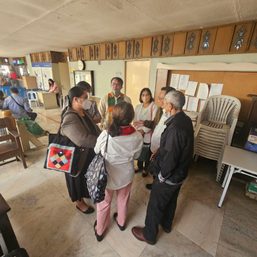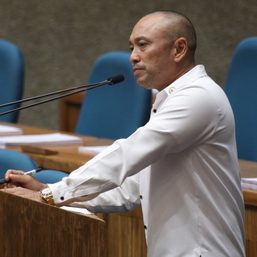SUMMARY
This is AI generated summarization, which may have errors. For context, always refer to the full article.
![[OPINION] Peace: An antidote for red-tagging](https://www.rappler.com/tachyon/2021/02/tl-peace-antidote-sq.jpg)
The cost of red-tagging is piling up. Yet another baby, one month old, is in jail with her mother. An elderly couple, both with health issues, were shot to death, supposedly for resisting arrest. Seven union organizers and a journalist have been arrested. Lumad students in a Catholic university dormitory in Cebu City have been “rescued” by police.
In all these and more, soldiers and police add agriculture to their duties, planting guns and explosives in each case. Many more have been brushed with a “red tag” putting them in danger of arrest, worse murder.
The military is working within an organizational contrivance with an unwieldy name – the National Task Force to End the Local Communist Armed Conflict (NTF-ELCAC) – but the massive P19 billion 2021 budget openly says these moves are for the purpose of dismantling the open structures of the Communist Party of the Philippines (CPP). They have not produced evidence these organizations are in fact, hidden fronts of the CPP. To cap these moves, the military would have the political parties under the Makabayan banner dismantled, disqualified from holding congressional positions they were elected to.
Precisely because these are open organizations, they are legal. Because advocating national democracy, even communism, is not illegal, the military has to plant weapons and explosives to justify their arrest and continued detention.
The military has to prove that these organizations support the New People’s Army (NPA) which, because it is engaged in armed struggle, is illegal. The death of the daughter of one of the congresspersons in the Makabayan group in an encounter with an NPA unit is not proof of such a connection.
The problem for democratic Left groups such as Akbayan and for opposition groups as a whole is that the military is one short step from targeting national democrats to democratic Left groups to the opposition.
This is clearly illustrated in the military attack on the tradition of academic freedom which kept the military out of university campuses. While the first target was the University of the Philippines (UP), it quickly expanded to 18 other universities and colleges.
The excuse? That UP and other campuses are recruiting grounds for the NPA.
The wrong questions
The political parties of the Makabayan bloc are, of course, not going to say they support the NPA, giving the government a legal basis for banning them. At best they say that “They (the Communist Party of the Philippines-NPA) are revolutionary groups. We may not agree with their program, we may not agree with the way they are pushing for their agenda but ang attitude natin sa kanila is i-engage (the attitude we have towards them is to engage) because we recognize that these revolutionary (organizations)…their struggles are rooted in very legitimate and historical grievances of the people…”
But maybe looking for organizational links between these parties and the NPA is the wrong question.
As underground organizations, the CPP and NPA carefully hide these links. What is harder to hide is what happens during elections. Aside from raising money in return for “Permits to Campaign” and “Permits to Win,” the NPA also express support for their preferred parties for party list elections. They might harass competing parties, including Akbayanm and openly support Makabayan parties. It should not be difficult for the military to find evidence of this.
The NPA is a much bigger problem for the country than open national democratic formations. Going after the NPA militarily is not an issue. What is a problem is the military’s aversion to peace negotiations.
The military leadership, all the way to Duterte, have recently said that there should be no peace talks. They have justified their opposition by saying the NPA is not “sincere.” Sincerity is not an issue in peace talks, but the design of and supervision of ceasefires is the issue.
In fact, such a ceasefire framework was put together by both the government and NDF panels more than a year ago before the military sabotaged it.
The more important reason for the military’s opposition to peace talks is that they believe the CPP-NPA is weak and can be defeated militarily.
I doubt that this is possible.
The NPA has ideological and organizational problems that has pushed the NPA to only a few areas. The military has new weapons and other equipment. But it is unlikely that the NPA can be defeated militarily. The NPA has had 52 years of protracted armed struggle without getting anywhere close to victory. On the other hand, the military has had 52 years of counterinsurgency without getting anywhere close to defeating the NPA.
The only way to break this protracted deadlock is through the peace process. Enough was achieved through years of peace negotiations to provide a firm foundation for their renewal. Open ND leaders have expressed support for restarting peace negotiations.
If a political settlement is achieved, and armed conflict ended, there is no more need for red tagging. Without the NPA, the CPP itself would have difficulty justifying its continued existence as an underground party.
Without the NPA and an open CPP, there is no one to whom Makabayan parties can be “tagged” to. We should unequivocally support the right the Makabayan parties to participate in elections.
At the same time, they have an unfair advantage where the NPA supports them. Violence, even threats of violence, whether from local politicians’ goon squads or from the NPA, have no place in democratic elections.
Another equally dangerous tool the military is sharpening is the anti-terror law. It is being questioned in the Supreme Court by many groups. Although dominated by Duterte appointees, we cannot predict what the Court will decide.
If it passes, the military will be able to arrest anyone without warrant, and keep them in jail without having to file cases against them for 24 days.
Will the police and military then stop being farmers and planting evidence on their arrest targets? Not likely. – Rappler.com
Joel Rocamora is a political analyst and a seasoned civil society leader. An activist-scholar, he finished his PhD in Politics, Asian Studies, and International Relations in Cornell University, and had been the head of the Institute for Popular Democracy, the Transnational Institute, and the Akbayan Citizens’ Action Party. He worked in government under former president Benigno Aquino III as the Lead Convenor of the National Anti-Poverty Commission.
Add a comment
How does this make you feel?





There are no comments yet. Add your comment to start the conversation.